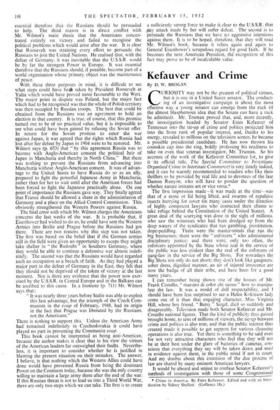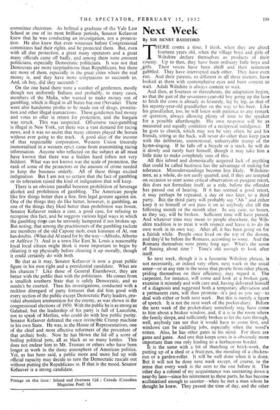Kefauver and Crime
By D. W. BROGAN
CURIOSITY may not be the greatest of political virtues, but it is one in a United States senator. The conduct- ing of an investigative campaign is about the most effective way a young senator can emerge from the ruck (if the almost blasphemous idea that the Senate can have a ruck be admitted). Mr. Truman proved that, and, more recently, the investigation headed by Senator Estes Kefauver of Tennessee into the tie-up of crime and politics projected him into the front rank of popular interest, and, thanks to his energy, revealed to millions on the television screen, he became a possible presidential candidate. He has now thrown his coonskin cap into the ring, boldly professing his readiness to take on even that veteran investigator, Mr. Truman. So his account of the work of the Kefauver Committee (or, to give it -its official title, The Special Committee to Investigate Organised Crime in Interstate Commerce) is very timely indeed, and it can be warmly recommended to readers who like their thrillers to be provided by real life and to devotees of the late Damon Runyon, who will have to ponder the question of whether nature imitates art or vice versa.* The first impression made—it was made at the time—was that of a stone or lid being lifted, and swarms of repulsive insects hurrying for cover (in many cases under the direction of highly competent lawyers who instructed their clients to take refuge behind the Constitution of the United States). A great deal of the scurrying was done in the sight of millions. who saw the witnesses who had been dredged up from the deep waters of the syndicates that ran gambling, prostitution, dope-peddling. There were the master-minds that ran the big businesses; there were the " enforcers " who administered disciplinary justice; and there were, only too often, the enforcers appointed by the State whose zeal in the service of the public was less evident than the zeal of the enforcers of gang-law in the service of the Big Shots. For nowadays the Big Shots not only do not shoot; they don't look like gangsters: sober dress, dignified manner, an air of injured innocence are now the 'badge of all their tribe, and have been for a good many years.
I can remember being shown one of the houses of Mr. Frank Costello, " maestro di color chi sanno " how to manipu- late the law. It was a model of dull respectability, and I should have been less surprised to see a Helen Kokinson lady come out of it than that engaging character, Miss Virginia Hill, whose boy friend, " Butsy " Siegel, died so suddenly and disagreeably. Television made both Senator Kefauver and Mr. Costello national figures. That the kind of publicity thus gained brought home, to tens of millions of viewers, the tie-up between crime and politics is also true, and that the public interest thus created made it possible to get support for various cleansing operations is also true. Yet there is something to be said even for not very attractive characters who feel that they will not be at their best under the glare of batteries of cameras, con- scious that everything they say will be taken down and used in evidence against them, in the public mind if not in court. And my doubts about this extension of the due process of law are shared by many eminent American lawyers. It would be absurd and unjust to confuse Senator Kefauver's methods Of investigation with those of some Congressional • Crime in America. By Estes Kefauver. Edited and with an Intro- duction by Sidney Shallett. (Gollancz 18s.) committee chairman. As befitted a graduate of the Yale Law School at one of its most brilliant periods, Senator Kefauver knew that he was conducting an investigation, not a prosecu- tion. He also knew that even witnesses before Congressional committees had their rights, and he protected them. But, even with all due protection, a great many operators and a great many officials came off badly, and among them were eminent politicians, especially Democratic politicians. It was not that Democrats are more turpitudinous than Republicans, but there are more of them, especially in the great cities where the real money is, and they have more temptations to succumb to. And, oh boy, did they succumb !
On the one hand there were a number of gentlemen, mostly though not uniformly Italians and probably, in many cases, members of the Mafia, who wanted to make money out of gambling, which is illegal in all States but one (Nevada). There were also handsome profits to be made out of drugs, prostitu- tion and other illegal transactions. These gentlemen had money and votes to offer in return for protection, and the bargain was struck. This was suspected. Off-course race-gambling is illegal in NeW York, yet there was a vast demand for racing news, and it was no secret that many citizens played the horses without ever going to the track. A good slice of the income of that respectable corporation, Western Union (recently immortalised in a western epic), came from transmitting racing information. Anyone who reflected on the subject at all must have known that there was a hidden hand (often not very hidden). What was not known was the scale of protection, the rank of some of the protectors or the amount of crime needed to keep the business orderly. All of these things excited indignation. But I am not so certain that the fact of gambling or its toleration raised the kind of indignation that will keep.
There is an obvious parallel between prohibition of beverage alcohol and prohibition of gambling. The American people like few things better than a fine, firm legal gesture against sin. One of the things they do like better, however, is gambling, as one of the things they liked better than prohibition was booze. Senator Kefauver makes a case, a good case, for refusing to recognise this fact, and he suggests various legal ways in which the gambling rings can be seriously hampered if not broken up. But noting, that among the practitioners of the gambling rackets are members of the old Capone mob, even kinsmen of Al, one has doubts. (What did Al stand for by the way—Alfredo, Alberto or Aelfrico ?) And in a town like East St. Louis a reasonably loyal local citizen might think it more important to begin by cleaning it up physically before cleaning it up morally, though it could certainly do with both.
Be that as it may, Senator Kefauver is now a great public figure in his own right and a presidential candidate. What are his chances ? Like those of General Eisenhower, they are better with the public than with the politicians. He comes from a smallish southern State that is safely Democratic, and so needn't be courted. Then his investigations, conducted with a reckless disregard of party fortunes that did him good with every section of the public except Democratic Party leaders, pro- vided abundant ammunition for the enemy, as was shown in the congressional elections of 1950. With the public he is as strong as Galahad, but the leadership of his party is full of Lancelots, not to speak of Merlins, who could do with less public purity. Senator Kefauver defeated the once invincible Crump machine in his own State. He was, in the House of Representatives, one of the chief and most effective reformers of the procedure of that archaic body. Now he has blown the lid off a score of boiling political pots, all as black as so many kettles. This does not endear him to Mr. Truman or others who have been longer at work in the dusty atmosphere of American politics. Yet, as has been said, a public more and more fed up with official rapacity may decide to turn the Democratic rascals out without putting the Republicans in. If that is the mood, Senator Kefauver is a strong candidate.



























 Previous page
Previous page